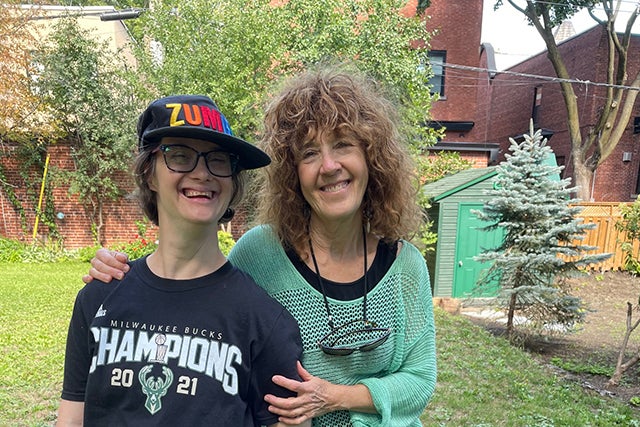Hannah’s Network supports family, fosters friendships

By Wendy Singer
Over 20 years ago, Evelyn and the late Charles Lusthaus were invited to set up a Support Network through Planned Lifetime Advocacy Network (PLAN) by their friend, a former student of Evelyn’s, psychologist Nancy Rother.
The Lusthaus’ accepted Rother’s offer, realizing this would be an excellent support for them and their daughter Hannah, now 44, who has Down syndrome. As the network facilitator, Rother began by recruiting people that Hannah had already formed strong relationships with, including her elementary school special education teacher Linda Mahler and her educator from social services Pamela Celani. The group began to meet and start thinking about Hannah over her lifetime.
“We can’t just rely on social services to care for people with disabilities,” said Lusthaus, now 75 and formerly a professor of Inclusive Education at McGill University and an inclusion advocate who worked closely with Judith Snow, the creator of Circles of Support (see p. 12). “We need community networks in order to give the person who’s vulnerable the friendships and support they need and enable parents and families to be less worried about what’s going to happen to their child after they die.”
Lusthaus describes her daughter as highly motivated with huge dreams. The network helps Hannah find ways to tap into those dreams at a level that she can achieve. Hannah attended Elizabeth Ballantyne Elementary School and Westmount High School of the English Montreal School Board (EMSB), John Abbott College’s vocational training program and enjoyed a work placement at Concordia University’s radio station. While at the university, she fulfilled her passion for basketball by becoming the Concordia Stinger’s much loved scorekeeper, a role she held for many years. She now attends the EMSB’s Wagar Adult Education Centre.
Hannah moved back home to live with her mother during the pandemic and dreams of returning to her apartment in Lachine. The network is actively working to realize this dream. They also have driven her to and from Wagar and supported her while her mother recuperated from surgery this summer.
The network has been “a life-saver” for Lusthaus, especially since her husband passed away three years ago. “I cannot even begin to tell you in words what it means to me to have this extraordinary support,” she said. “They love Hannah, partly because she is a loving person, but people learn through their involvement and identify the beautiful parts of the person. This is quite different from a social services model, where professionals are trained to see the needs and the deficiencies.”
To begin a Support Network, Lusthaus encourages parents to find a facilitator to recruit a core group of five or six people, with other members coming in and out as needed. Group size will vary depending on the needs of the individual at the centre of the network.
As Hannah’s Network’s facilitator, Rother initiates group meetings, keeps in close contact with Lusthaus to discuss any necessary action needed, and advocates on the Lusthaus’ behalf.
According to Rother, it can be very hard for parents to ask for help. “Reaching out reveals our vulnerability, and we worry that what we ask will pose a burden to others. Having a facilitator do the asking can be a great support to families,” she said. In Rother’s experience, typically, everyone says yes!
“This is about being part of a web of relationships and engaging with the person at the centre of the network in a way that is reciprocal, authentic, and deeply meaningful. All of us need to belong, contribute, be acknowledged and appreciated for our contributions, and to experience the love and care which flows from relationships. In a network, we all have the opportunity for these kinds of enriching experiences,” she added.
Rother describes the experience of being in Hannah’s Network as deeply meaningful: “I love Hannah. Our relationship has grown over many years. She’s introduced me to Zumba and Hip Hop! She enlarges my life. And it gives me hope when I see how eager people are to help and contribute when we put out the call.”
Lusthaus said Snow shared powerful words with her some 25 years ago that impacted her life and decision to start Hannah’s network: “Judith Snow challenged me, saying, ‘You don’t like to ask for help, do you?’ That went straight inside. That opened me up to the possibilities of support. After that, I learned to ask for help.”
To learn more about network facilitation, read Nancy Rother’s publication Reaching Out: A portrait of Social Network Facilitation in Canada at https://planinstitute.ca/wp-content/uploads/2018/02/Reaching-Out.pdf









